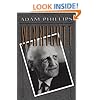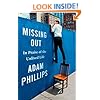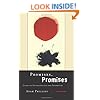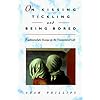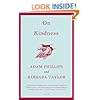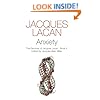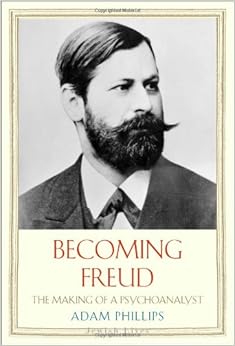
Becoming Freud (Jewish Lives)
and over one million other books are available for Amazon Kindle. Learn more


Flip to back
Flip to front

Becoming Freud: The Making of a Psychoanalyst (Jewish Lives) Hardcover – Deckle Edge, May 27, 2014

$17.09
FREE Shipping on orders over $35.
In Stock.
Ships from and sold by Amazon.com.
Gift-wrap available.
NO_CONTENT_IN_FEATURE
Start reading Becoming Freud (Jewish Lives) on your Kindle in under a minute.
Don't have a Kindle? Get your Kindle here, or download a FREE Kindle Reading App.
Don't have a Kindle? Get your Kindle here, or download a FREE Kindle Reading App.
Best Books of the Month
Want to know our Editors' picks for the best books of the month? Browse Best Books of the Month, featuring our favorite new books in more than a dozen categories.
Want to know our Editors' picks for the best books of the month? Browse Best Books of the Month, featuring our favorite new books in more than a dozen categories.
Product Details
Would you like to update product info or give feedback on images?.
|
Editorial Reviews
Review
‘Becoming Freud offers more than enough proof that Phillips is the ideal author of a book about Freud.’—Talitha Stevenson, Financial Times
(Talitha Stevenson Financial Times 2014-05-31)‘The book’s structure is bound by two constraints: the brevity of the period covered – the first 50 years of Freud’s life (he lived until he was 83) - and his Jewishness. But, as with Shakespeare working within the strictures of the sonnet form, Phillips presses these potential limits to acute and dazzling effect.’—Salley Vickers, The Daily Telegraph
(Salley Vickers The Daily Telegraph 2014-06-21)‘[T]his short, meditative succeeds superbly in delineating the culture and thought processes that lay behind his work.’—Ian Critchley, The Sunday Times
(Ian Critchley The Sunday Times 2014-06-15)‘More a biographical essay than a comprehensive biography, since it ends with Freud aged 50, this beautifully lucid book is jargon-free and richly informative, which is hardly surprising since Phillips was the series editor of The New Penguin Freud.’—Helen Meany, Irish Times
(Helen Meany The Irish Times 2014-08-15)"As a writer, Mr. Phillips specializes in paradoxes and antitheses — almost all of which he puts forth thoughtfully and gracefully . . . An intelligent and well-written book."—Steven Marcus, New York Times
(Steven Marcus New York Times)"An audacious book. . . . Its implicit goal, never stated but always clear, is to help us salvage the best parts of Freud’s work while leaving behind the rest—the outmoded theories and unwieldy jargon that make Freud a caricature rather than an intriguing thinker."—Joshua Rothman, New Yorker Blog (Joshua Rothman New Yorker Blog)
"Clear and engaging."—Kirkus Reviews
(Kirkus Reviews)"A compact intellectual biography. . . . Phillips often illuminatingly reads Freud's thinking against the background of his life circumstances. . . . Probably more than any other psychoanalytically informed writer, Phillips has continued to enrich this mode of thought by literary means, through sheer force of style."—Kenneth Baker, San Francisco Chronicle
(Kenneth Baker San Francisco Chronicle)"Phillips excels at re-describing concepts and experiences whose meanings appear settled, stale or too technical."—Kenneth Baker, San Francisco Chronicle
(Kenneth Baker San Francisco Chronicle) "Telling a great story gracefully and with the clarity it deserves, in all its layers, Adam Phillips demonstrates that Freud remains central to the urgent questions of modernism— social, political and cultural, as well as psychological. I will be thinking about specific sentences in this book for a long time."—Robert Pinsky
(Robert Pinsky)
From the Author
Praise for Adam Phillips
“Adam Phillips is one of the richest and most rewarding essayists of our time." —Los Angeles Times
“Phillips has made psychoanalytic thought livelier and more poetic than ever.”—New York Times
“The curious thing about reading Phillips is that he makes you feel smart and above the daily grind at the same time as he reassures you that you are not alone in your primal anxieties about whether you are lovable or nuts or, perhaps, merely boring.” —New York Times Magazine
“Adam Phillips writes with far-sighted equanimity. . . . He’s a little like an Oliver Sacks of psychoanalysis, both affable and unalarmed.” —Boston Sunday Globe
“[Phillips is] one of the finest prose stylists at work in the language, an Emerson of our time.” —John Banville
"Phillips’s authority as a writer comes in no small part from his own experience as a highly regarded therapist." —Boston Globe
"[Phillips is] adept at making the complex comprehensible.”—Independent
“In Phillips’ hands, nothing is as ordinary as it appears to be. Each essay is a kind of mystery tour; you never know where you are going to end up.”—Times Literary Supplement
“[Phillips has] punched lovely skylights into the gloomy Freudian edifice and in general done much to rehabilitate the psychoanalytic enterprise by honoring the idiosyncrasy of human experience and by wielding method lightly, playfully, humanely.”—Esquire
“Adam Phillips is one of the richest and most rewarding essayists of our time." —Los Angeles Times
“Phillips has made psychoanalytic thought livelier and more poetic than ever.”—New York Times
“The curious thing about reading Phillips is that he makes you feel smart and above the daily grind at the same time as he reassures you that you are not alone in your primal anxieties about whether you are lovable or nuts or, perhaps, merely boring.” —New York Times Magazine
“Adam Phillips writes with far-sighted equanimity. . . . He’s a little like an Oliver Sacks of psychoanalysis, both affable and unalarmed.” —Boston Sunday Globe
“[Phillips is] one of the finest prose stylists at work in the language, an Emerson of our time.” —John Banville
"Phillips’s authority as a writer comes in no small part from his own experience as a highly regarded therapist." —Boston Globe
"[Phillips is] adept at making the complex comprehensible.”—Independent
“In Phillips’ hands, nothing is as ordinary as it appears to be. Each essay is a kind of mystery tour; you never know where you are going to end up.”—Times Literary Supplement
“[Phillips has] punched lovely skylights into the gloomy Freudian edifice and in general done much to rehabilitate the psychoanalytic enterprise by honoring the idiosyncrasy of human experience and by wielding method lightly, playfully, humanely.”—Esquire
More About the Author
Discover books, learn about writers, read author blogs, and more.
Customer Reviews
Most Helpful Customer Reviews
9 of 9 people found the following review helpful
By
The Reluctant Psychoanalyst
on August 7, 2014
Format: Hardcover
Verified Purchase
Comment
Sending feedback...
Adam Phillips’ slender biography of Freud published this year (2014) and titled “Becoming Freud” is one that I was quite intrigued to read. It is brief, written by an analyst who is also the editor of the new Penguin Standard Edition of Freud – someone who is editing the new translations without speaking German! Does he get Freud? Well, he spends the first chapter clarifying that, from Freud’s perspective, there is no such thing as an accurate biography. From Freud’s (via Phillips) perspective, the biography is more about the biographer than about the object of the biography, just as this blog is more about me than about Adam Phillips’ work, and just as what you think or say about this blog is more about you than me, Phillips, or Freud. From Freud’s perspective, it is the subjective experience of the person that matters. And this is, I believe, at the heart of what it is that Freud had to say and certainly Phillips takes this stance as well.
So Phillips approach to Freud is not to flat footedly analyze him by attributing actions to hypothesized unconscious motivations as others have sometimes done, instead he takes a swirling, free associational stab at describing Freud’s history – what is known and so much that is unknown and, in a weird approach for a psychoanalyst, he analyzes not Freud the person so much as Freud the socio- psychoanalytic individual who emerges at a particular point in history – the history of European thought – he sees Freud as a left over Romantic as the world is becoming modern (ironically largely at his prodding) – and the history of European Judaism – Freud may be a Godless Jew, but he is deeply determined, Phillips believes, by his cultural origins.
To see the rest of the review, please Google Adam Phillips and the Reluctant Psychoanalyst...
So Phillips approach to Freud is not to flat footedly analyze him by attributing actions to hypothesized unconscious motivations as others have sometimes done, instead he takes a swirling, free associational stab at describing Freud’s history – what is known and so much that is unknown and, in a weird approach for a psychoanalyst, he analyzes not Freud the person so much as Freud the socio- psychoanalytic individual who emerges at a particular point in history – the history of European thought – he sees Freud as a left over Romantic as the world is becoming modern (ironically largely at his prodding) – and the history of European Judaism – Freud may be a Godless Jew, but he is deeply determined, Phillips believes, by his cultural origins.
To see the rest of the review, please Google Adam Phillips and the Reluctant Psychoanalyst...
Thank you for your feedback.
If this review is inappropriate, please let us know.
Sorry, we failed to record your vote. Please try again
8 of 9 people found the following review helpful
By
EA Poe
on July 28, 2014
Format: Hardcover
Verified Purchase
Comment
Sending feedback...
The problem with this book is the authors penchant for tortuous sentences. He enjoys nesting observations with the liberal use of the semicolon. It makes for a tough slog through an interesting view of a complicated personage. I found myself repeatedly rereading his words before making sense of his point.
Thank you for your feedback.
If this review is inappropriate, please let us know.
Sorry, we failed to record your vote. Please try again
19 of 25 people found the following review helpful
By
marcus
on June 16, 2014
Format: Hardcover
Comment
Sending feedback...
Adam Phillips is the most interesting writer/thinker
imaginable. If you are interested in Freud, history,
being Jewish, being a genius, or just a fabulous
read in stylish writing, get this at your independent
bookstore.
imaginable. If you are interested in Freud, history,
being Jewish, being a genius, or just a fabulous
read in stylish writing, get this at your independent
bookstore.
Thank you for your feedback.
If this review is inappropriate, please let us know.
Sorry, we failed to record your vote. Please try again
8 of 11 people found the following review helpful
By
Margy Fetting
on August 7, 2014
Format: Hardcover
Verified Purchase
1 Comment
Sending feedback...
I was sitting in a cafe yesterday on an island in the Aegean Sea, vigorously engaged with Adam Phillip's ecstatic sentences, while concluding his latest and most riveting book, "Becoming Freud".
A southern gentleman psychiatrist sat down next to me and looked at my tri-color markings and notebook. "Ah, he warmly critiqued, "you must not know how to separate the wheat from the chaff?" A visceral response swelled up in me , "The author has a reverence for the sentence, and I his".
I searched later and found a George Elliot sentence,“A friend is one to whom one may pour out the contents of one's heart, chaff and grain together, knowing that gentle hands will take and sift it, keep what is worth keeping, and with a breath of kindness, blow the rest away.”
A reader friend for decades sends her thanks for a most stirring, unsettling and intimate read of new pleasures to add to our dream work.
A southern gentleman psychiatrist sat down next to me and looked at my tri-color markings and notebook. "Ah, he warmly critiqued, "you must not know how to separate the wheat from the chaff?" A visceral response swelled up in me , "The author has a reverence for the sentence, and I his".
I searched later and found a George Elliot sentence,“A friend is one to whom one may pour out the contents of one's heart, chaff and grain together, knowing that gentle hands will take and sift it, keep what is worth keeping, and with a breath of kindness, blow the rest away.”
A reader friend for decades sends her thanks for a most stirring, unsettling and intimate read of new pleasures to add to our dream work.
Thank you for your feedback.
If this review is inappropriate, please let us know.
Sorry, we failed to record your vote. Please try again
1 of 1 people found the following review helpful
By
Yuri
on August 24, 2014
Format: Hardcover
Verified Purchase
Comment
Sending feedback...
Beautifully and cleverly written book. Could not stop reading! Lots of genuine insights are sprinkled throughout. Add to you smart reading collection!
Thank you for your feedback.
If this review is inappropriate, please let us know.
Sorry, we failed to record your vote. Please try again
By
Arheddis Vaarkingjaab
on October 12, 2014
Format: Kindle Edition
Verified Purchase
Comment
Sending feedback...
I couldn't get interested in this book because of the unnecessarily complex and just plain awkward sentence structures the author uses. I continually found myself having to re-read sentences to try to understand what I had just read. The difference between this writer and others who may be difficult, is that too often a second reading still yielded little sense in this book. Other biographical treatments of Freud are more clear and informative; this one is just baffling.
Thank you for your feedback.
If this review is inappropriate, please let us know.
Sorry, we failed to record your vote. Please try again
By
Angel Velez Diaz
on October 12, 2014
Format: Kindle Edition
Verified Purchase
Comment
Sending feedback...
This is an obtuse book that will leave you questioning time after time what is it that the writer is trying to communicate. It is a frustrating book that I put away about halfway through. Two friends of mine, psychologists also, had the same experience and, likewise, did not finish reading the book. If you are interested in reading about Freud's life, Ernest Jones and Peter Gay have written far better biographies.
Thank you for your feedback.
If this review is inappropriate, please let us know.
Sorry, we failed to record your vote. Please try again
By
CHARLES A. SARNOFF
on October 11, 2014
Format: Kindle Edition
Verified Purchase
Comment
Sending feedback...
I am a graduate psychoanalyst. I have been in practice for over fifty years.
I was trained in child analysis by Anna Freud. I am the author of pber 60 papers an8 8 books. "Latency" sold over fifty thousand copies.
I found the book to be reviewed to be inaccurate, plopy researched, and miss-leading
I was trained in child analysis by Anna Freud. I am the author of pber 60 papers an8 8 books. "Latency" sold over fifty thousand copies.
I found the book to be reviewed to be inaccurate, plopy researched, and miss-leading
Thank you for your feedback.
If this review is inappropriate, please let us know.
Sorry, we failed to record your vote. Please try again
